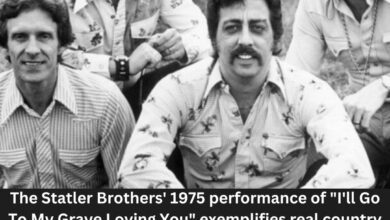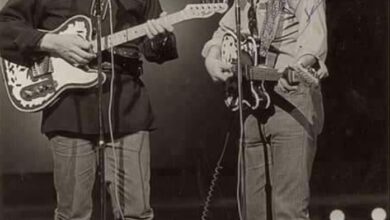Elvis Presley’s Iconic “If I Can Dream” Showcase From The ’68 Comeback Event
Elvis Presley’s performance of “If I Can Dream” during his iconic ’68 Comeback Special is often heralded as a pinnacle moment in his career and in the broader narrative of American music. This event, which aired on December 3, 1968, signified not just a revival of Elvis’s live performances but also marked a critical juncture in a turbulent period in U.S. history. The late 1960s were rife with civil rights movements, anti-war protests, and a cultural shift that increasingly embraced the power of music as a conduit for social commentary. Elvis’s return to the stage was a breath of fresh air in a nation yearning for hope and inspiration amidst the chaos of the times.
The song itself, “If I Can Dream,” was penned by Walter Earl Brown and was directly inspired by the civil rights movement. Its lyrics draw deeply from the ideals encapsulated in Martin Luther King Jr.’s famous “I Have a Dream” speech, infusing the performance with a poignant social conscience. In a time marked by unrest and division, Elvis’s singing of this song became a rallying cry for peace, love, and understanding, themes that echoed throughout the social landscape of America. The performance, thus, transcended mere entertainment; it became a statement reflecting the aspirations of a society longing for unity and healing.
Visually, Elvis’s presentation during the special was striking. Dressed in a form-fitting black leather suit, he embodied a sense of rebellion and raw passion that captivated the audience. The contrast of his attire against the lush orchestral arrangements only amplified the emotional impact of the song. The full orchestration added layers of depth to his vocal delivery, which was characterized by a fervent intensity that resonated deeply with viewers. Each belted note carried with it a sense of urgency and longing, making it an arresting moment of musical expression that felt both personal and universal.
The ’68 Comeback Special itself diverged from the conventional television format of musical performances, emphasizing Elvis’s dynamic stage presence and engaging with the audience in a more authentic manner. Not only did it reintroduce Elvis to existing fans, but it also reached a new audience who might not have been acquainted with his past works. By showcasing his talent in a contemporary environment, the special reaffirmed Elvis’s place as a music legend and a cultural icon, reminding viewers that his voice was still a vital part of the American music scene.
Years later, in 2015, the essence of “If I Can Dream” was revived through a collaboration between the Royal Philharmonic Orchestra and Elvis’s original recordings. Led by Priscilla Presley, this project aimed to connect a new generation with Elvis’s timeless music while preserving its historical significance. Featuring arrangements recorded at Abbey Road Studios, the album titled “If I Can Dream: Elvis Presley with the Royal Philharmonic Orchestra” not only honored the legacy of the King but also breathed new life into classic tracks, reinforcing the notion that Elvis’s messages of hope continue to resonate in modern times.
This updated rendition of “If I Can Dream” alongside other iconic songs signified a bridge between the past and the present, showcasing how Elvis’s original artistry remains relevant. The lush orchestral support paired with his original vocal tracks created a fresh yet familiar musical experience, inviting listeners to reflect on the enduring messages contained within his work. The project highlighted not only the timeless nature of Elvis’s music but also the continued relevance of its themes amid ongoing global issues.
Elvis Aaron Presley was born on January 8, 1935, in the small town of Tupelo, Mississippi. As a pivotal figure in the evolution of rock ‘n’ roll, Elvis’s blend of musical influences—sternly rooted in the rhythms of blues, the twang of country, and the emerging sound of rock ‘n’ roll—revolutionized the music industry. His unique vocal style, combined with an electric stage presence, made him an instant sensation and a significant cultural figure. Over the course of his career, he received numerous accolades, including multiple Grammy Awards, which underscored his influence and contributions to music.
Despite his untimely passing on August 16, 1977, Elvis’s legacy flourished, as he continued to inspire countless artists and entertain millions of fans worldwide. His impact on the music industry is undeniable, with his recordings often serving as benchmarks for modern musicians. The iconic Graceland estate has transformed into a Mecca for fans, drawing thousands each year who seek to honor the memory of the man who forever changed the fabric of American music.
The message of “If I Can Dream” continues to resonate across generations. Its themes of hope, peace, and unity remain pertinent in today’s world, where divisions and social challenges persist. The song serves as a reminder that music has the unique ability to encapsulate human experiences and emotions, prompting reflections on societal aspirations. In both Elvis’s original performance during the ’68 Comeback Special and the orchestral reinterpretation, there is a profound sense of continuity—a belief in the power of dreams and the potential for love to prevail over strife.
Elvis Presley’s artistry, characterized by a heartfelt yearning for cohesion and understanding, speaks to an enduring legacy. His music, steeped in emotional honesty, aligns closely with universal human experiences, ensuring that the King of Rock ‘n’ Roll’s spirit continues to uplift and inspire. Cherished not only for his node as a musical phenomenon but also for his contributions to social dialogue, Elvis’s works remain a vital part of the American cultural landscape, encouraging each generation to dream and strive for a brighter tomorrow.





